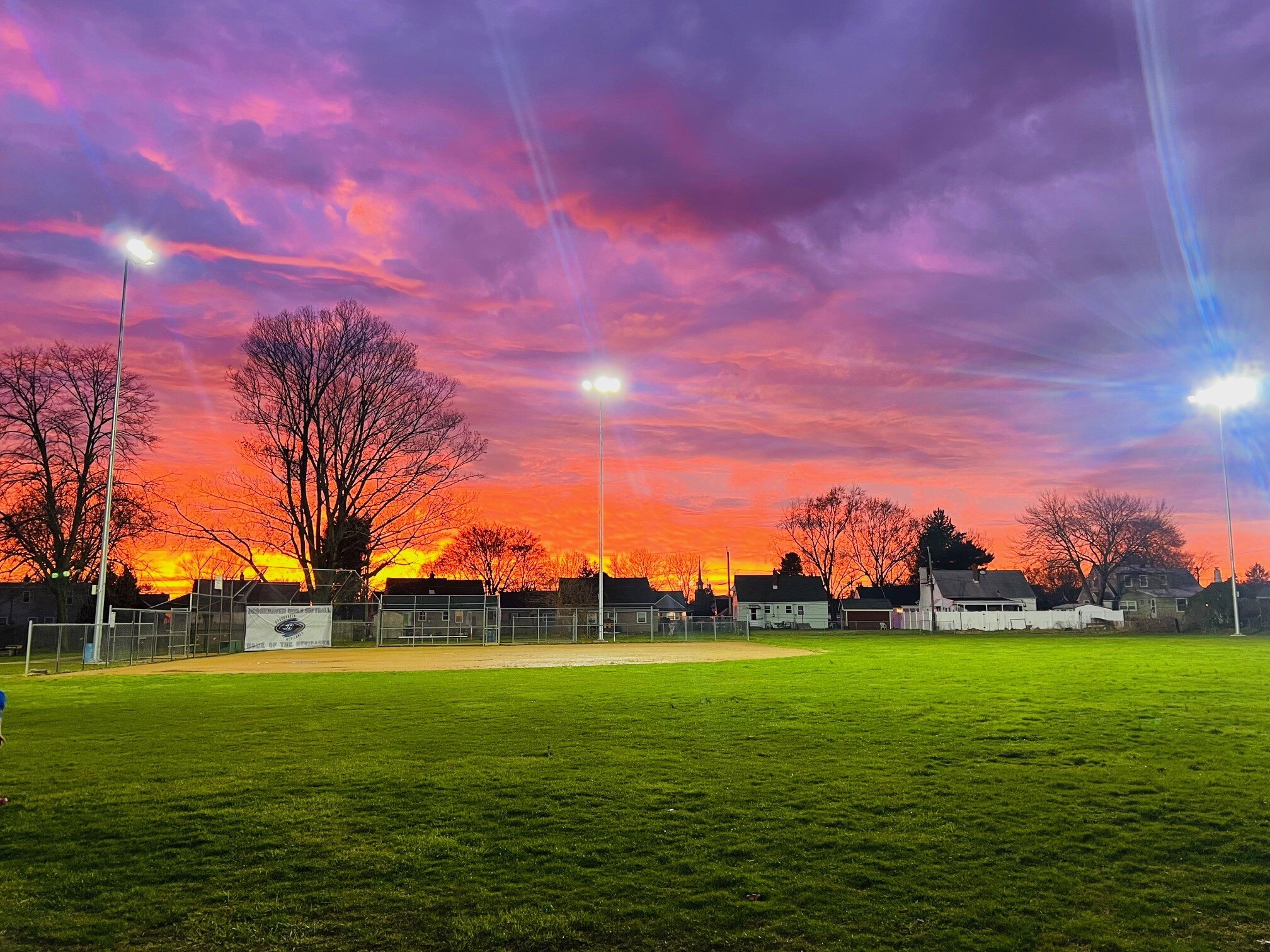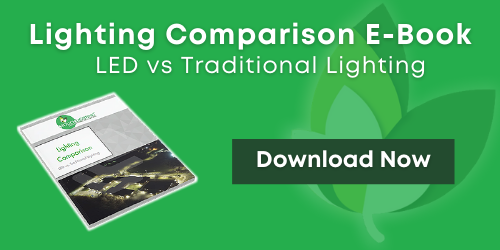
Sports Lighting
What is a Sports Field Lighting Application?
Outdoor sports lighting is a type of site light fixture that is commonly used to illuminate large areas for sporting events or other large outdoor events and activities, such as concerts. Sports light fixtures are typically mounted on poles 40 to 100 feet tall, with between 1-12 fixtures mounted on each pole. This type of outdoor lighting is often used by schools, colleges and universities, municipalities, amateur sports clubs, and professional sports franchises.
Below are a few image examples of sports field lighting:


Most existing sports field lights utilize high intensity discharge (HID) lamps such as metal halide, high pressure sodium, and - if they are very old - mercury vapor lamps.
Here are some comparison blogs you can read to learn about the differences in these types of lamps:
- Lighting Comparison: LED versus HID Lights
- Lighting Comparison: LED vs Metal Halide Lights
- Lighting Comparison: LED vs High Pressure Sodium (HPS) and Low Pressure Sodium (LPS)
Common Issues
All HID lamps have some inherent characteristics that can lead to issues for those managing the exterior lighting applications.
Energy Costs
Common (HID) lamp wattages used for conventional sports lighting fixtures range from 400 watts to 2,000 watts. The higher the wattage the higher the light output. The function of the area being illuminated, combined with the quantity, spacing, and mounting height of the field light fixtures plays a role in the existing wattages utilized. A few 1000w or 2000w metal halide sports light lamps (very common wattages for existing outdoor sports lighting) can cost up to $6,300 and $12,500, respectively, to operate per year, in electricity costs alone.
Maintenance Costs
Maintenance costs are often a big concern for those managing lights at a stadium. In addition to the potential lamp lifetime concerns, sports field fixtures can easily cause interference with the day to day activities of teams or employees when changing out a lamp or a ballast. So how much do stadium lights cost to run? It can cost up to $2,000 in labor and material to maintain a single exterior HID sports field fixture over the course of three years.
Lighting Performance
Depending on the type of HID lamp your facility utilizes, the performance characteristics of your existing sports field lighting can vary significantly. For example, if you are using metal halide lamps you may see light that is whiter, but these types of lamps tend to have accelerated lumen degradation, meaning the light output of the lamps decrease quickly after initial install, and as a result the overall lifetime of the lamp decreases (we have all seen those outdoor fixtures that have “pink” lamps that are barely providing any illumination on the ground). If you are using high pressure sodium you may see longer “useful” life as these lamps see less lumen degradation than metal halide, but their fuel structure produces a very “orange” light with a very low color rendering index. So basically you trade a longer life for a poorer quality light, in regards to visual perspective with HPS.
What are the benefits of LED Sports Lighting?
LED sports field lighting provides excellent benefits for large areas or sites requiring illumination because of how they GENERATE light and how they DISTRIBUTE light. Light emitting diodes generate light via a semi-conductor, as opposed to the consumption of a “fuel source” like in HID lamps.
In regards to “distributing” light, LED sport light fixtures commonly utilize “multi-point” sources, meaning the fixtures have multiple diodes with individual optics. When you compare this to the way most HID fixtures distribute light (with a single bulb and reflectors within the fixture), the result is light that is more EVENLY “distributed’ across a given area.

The Three Most Common Benefits of LED Sports Field Lighting
Energy Savings
Common wattages for LED sports field light fixtures generally range from 209 watts to 750 watts, often resulting in a 50%-80% reduction in energy consumption. The reason for this can be attributed to the GENERATION comments above, and can result in savings of up $8,000 per fixture per year in electricity cost.
Maintenance Cost Reduction
Again, due to the way LEDs generate light, the way they progress through their functional life is much different. Instead of ceasing to function properly once a fuel source is significantly reduced, LED generated light output degrades VERY SLOWLY over time. As a result the functional life (often in excess of 100,000 hours) of an LED fixture can be significantly longer than that of a HID Lamp, which in turn drastically reduces the costs for maintaining exterior light fixtures over a longer period of time.
Lighting Performance
Moving on to the way LED fixtures DISTRIBUTE light: as a result of the multi-point design, LED sports field fixtures for site and large area applications often provide a very EVENLY distributed light pattern. What this means is that light levels across a given surface will vary less as the distance from the pole or fixture changes. Compared to HID fixtures, which often produce a “bright spot” directly underneath the fixture with light levels decreasing drastically as the distance from the pole increases. The result, in regards to LED vs HID, is a more even foot candle distribution from the LED conversion. In addition to the even distribution of light, LEDs are available in a range of color temperatures, and as a result provide a range of options to increase the visual perception of “brightness."
Learn about Sports Lighting from Stouch
Explore our comprehensive collection of guides, tips, and insightful information dedicated to sports lighting, designed to illuminate your knowledge and empower your LED distribution journey.
Visual Guide For Soccer Field Lighting Cost Breakdown?
Football Field Lighting Cost Guide
How Much Does Football Field Lighting Cost?
Visual Guide For Football Field Lighting Cost Breakdown
How Much Does Softball Field Lighting Cost?
What are the next steps to improve my sports lighting application?
The first step is to speak with an LED lighting solutions provider that is manufacturer-neutral. Why this approach as opposed to the company you may have used for the past several years? Unless that company has a focus on providing LED solutions, it is unlikely that they will have the performance-focused mentality that is required to obtain the desired results of an LED lighting project for your sports field lighting applications.
A crucial step in any LED project is understanding that LED lighting is NOT a commodity.
Prior decades consisted of building facility managers and building owners evaluating product options purely on cost, assuming that all of the options in consideration were equal in quality. This is not case with exterior LED Lighting.
A solution-focused supplier should ask you about your project objectives.
Do you have...
- Budget constraints?
- Return On Investment Criteria?
- Energy reduction targets?
- Lighting performance requirements?
The appropriate partner will want to get an understanding of your desired outcome, not just what specific products they can sell you. Not all LED products are created equal. There are different levels of value from different manufacturers for different applications, and by working with a company that has the product expertise to recommend a solution that meets your project priorities, you will ultimately achieve the best results. We'd love to know more about your upcoming lighting project, contact us and we'll get in touch with you.

